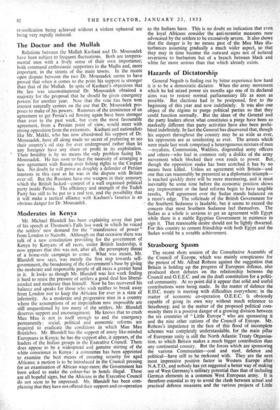Hazards of Dictatorship
General Neguib is finding out by bitter experience how hard it is to be a democratic dictator. When the army movement which he led seized power six months ago one of its declared aims was to restore normal parliamentary life as soon as possible. But elections had to be postponed, first to the beginning of this year and now indefinitely. It was also one object .of the regime to purge- political parties so that they could function normally. But the ideas of the General and the party leaders about what constitutes a purge have been. so markedly different that party activities have also been prohi- bited indefinitely. In fact the.General has discovered that, though his support throughout the country may be as wide as ever, his opponents are as unrelenting as ever. The arrests which were made last week comprised a heterogeneous mixture of men —royalists, Communists, Wafdists, disgruntled army officers and others—who had in common only a dislike of the army movement which blocked their own roads to power. But, though the opposition snake has been scotched it has by no means been killed. Unless an agreement with Britain—and one that can reasonably be presented as a diplomatic triumph— - is reached quickly there will be more murmuring, and it must inevitably be some time before the, economic position shims any improvement or the land reforms begin to have tangible resultst. Full agreement over the Sudan stands balanced on a razor's edge. The solicitude of the British Government for the Southern Sudanese is laudable, but it seems to exceed the concern that most Southern Sudanese feel themselves. The Sudan as a whole is anxious to get an agreement with Egypt while there is a stable Egyptian Government in existence to sign it. That reasonable desire should not be lightly thwarted. For this country to cement friendship with both Egypt and the Sudan would be a notable achievement.


































 Previous page
Previous page